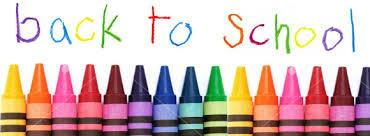

Has the start of the school year come upon you like the force of a tornado?
It always seems to sneak up on me, leaving me utterly unprepared. From a therapy perspective, my head is in the clouds, and I am relishing that fact that I have finally picked up momentum; “bye bye” to those irksome behaviors, and “hello” to some new great ones. Then BAM! school begins and it is time to focus on the fact that our kiddos will be spending the majority of their days behind those (often fortress-strength) walls.
Alas, school has in fact, begun. Have you mastered the fine art of waking your kid up on time? Packing those lunches? Now that you have a moment to yourself, it is time to get down to the nitty gritty. I would like to underscore the fact that starting the year off on both a good note and with clear and consistent expectations will (hopefully) pave the way for a less tumultuous school year. Here are a few things to keep in mind at the start of the year:
1. Establish a communication system. Many teachers already have a plan as to how they will communicate with the home. Is this plan enough for you? Does it contain information that is really meaningful to you, such as behavior, homework, or health reports? Is it frequent enough? Do you want to see raw data? Does your consultant want to see raw data?
I have encountered teachers who are very resistant to frequent communications, which of course sounds absurd to the parent, but I believe that the bulk of their wariness is a fear that it will become too cumbersome. How can you show that in good faith you simply want to know what is going on with your child?
And, as a last resort, you can always request an IEP meeting to discuss this issue. I have seen several cases where the frequency of these reports is contained in the official documentation.
Isn’t this daily sheet cute as a button? For more info click here.
Looking for something a little more succinct and personalized? Ask your consultant for a more individualized form that you can give to your child’s teacher as a starting point.
2. Establish reinforcers. Hopefully you have had ample opportunity to share tips and tricks before the school year began, but encouraging your child’s teacher to conduct reinforcer assessments is extremely important. Remember, just because something works at home, it might not work at the school. Something that I often see is that the school is not able to identify/provide strong enough reinforcement. What are the barriers to this issue? Administrative? Monetary? How can you think outside the box in an effort to provide effective motivation for your child? It might be safe to say that if you have no reinforcers, you don’t have much… So make this a priority!
Check out this gem of a list that gives you ideas for reinforcers based on modalities.
http://freeabaworksheets.files.wordpress.com/2014/01/potential-reinforcer-checklist-1.pdf
3. Establish a baseline and/or share information from the summer. As mentioned, I had the opportunity to deliver some pretty intensive services this summer. I always make sure to write a baseline report of the skills that the child had coming into the summer (essentially after leaving school) and the skills that the child has at the end of the summer (what they are entering school with). This information can be extremely helpful to your child’s new teacher, and can hopefully provide a brief snap shot of your child’s currents strengths and needs. Bonus points if the new teacher is willing to establish a relationship with your consultant- this will make for a power team!

4. Provide structure at home. It is no secret that most of our kids have difficulty with transitions. Of course, a transition to a new school year is a big one. Although it may seem counter-intuitive, I believe that providing as much structure and predictability at home during this time is tantamount (as opposed to letting him have a break and rest after school). Has your consultant already made you a schedule in the past? Now is the time to get it out!
Here is a whole pinterest board of ideas for picture schedules.
http://www.pinterest.com/sensoryprocessi/picture-schedules/
Of course, lean on your consultant to make sure that the schedule is presented in an appropriate modality and level for your child!
5. Pair with the teachers. I know this seems silly, but I do believe that this is very important. Well… It’s important if you subscribe to the “you get more bees with honey than vinegar” methodology. And, oh yeah, there is an entire branch of ABA that is dedicated to developing professional relationships and better work production, called Organizational Behavior Management. Some ideas for pairing with teachers might be:
-find something you have in common
-display empathy for the stressful start of the year.
-talk about how much your child likes her.
-bring her something (like coffee)
Those are just a few ideas, but there are many more!
Lastly, don’t let the start of the school year get away from you. When attempting to address issues, teachers/administrators will often say, “Oh this is a transition period”, or “we are still assessing”. While these things might be true, you can’t afford to waste an entire quarter on these items. Persistance is key!
“Energy and persistence conquer all things.” ~Benjamin Franklin
Good luck!
~Jill
